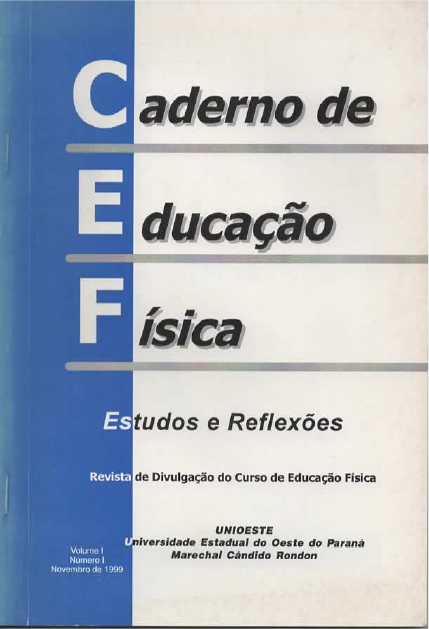Learning theories and physical education (motor education): approaches to teaching
DOI:
https://doi.org/10.36453/cefe.1999.n1.p22Keywords:
Learning Theories, Elementary and high school, PhysicalAbstract
The study aims to explore learning theories applied to Physical Education, focusing on how different pedagogical paradigms influence teaching methods and knowledge construction in the school environment. The research analyzes three pedagogical models based on the epistemological paradigms described by Becker (1994): directive, non-directive, and relational pedagogy. Directive pedagogy, grounded in empiricism, considers the student a "blank slate" and prioritizes the teacher's role in knowledge transmission. Non-directive pedagogy, supported by innatism, minimizes the teacher's interference and emphasizes spontaneous learning, often resulting in learning inequalities. Finally, relational pedagogy, associated with constructivism/interactionism, suggests that knowledge is built through interactions between teacher, student, and environment, respecting students' prior knowledge. In this approach, strategies such as "guided discovery" and "problem-solving" are recommended as they foster active learning and co-construction of knowledge. Relational pedagogy is highlighted as the most suitable model for Physical Education because it encourages students' active participation, respects their individuality, and promotes critical and creative development. This model transforms the teaching-learning relationship into a collaborative and continuous process, preparing students to become agents of social change. Adopting this paradigm requires significant changes in pedagogical practices, emphasizing mediation and fostering autonomy and reflection.
Downloads
References
BECKER, F. Modelos pedagógicos e modelos epistemológicos. Educação e Realidade, Porto Alegre, v. 19, n. 1, p. 89-96, jan./jun., 1994.
CANFIELD, J. T. Estilos de ensino de Mosston. Santa Maria: UFSM, 1986. Apostilado.
COLL, C. Hacia una diferenciación de los contenidos escolares. In: Los contenidos en la reforma. Cal! et al. Madrid: Santillana, 1992.
COLL, C.; SOLÉ, I. Los profesores y la concepción constructivista. In: El constructivismo en el aula. Barcelona: Editorial Graó, 1994.
CURTISS, S. A alegria do movimento na pré-escola. Porto Alegre: Artes Médicas, 1988.
DAVIS, C.; OLIVEIRA, Z. Psicologia na Educação. São Paulo: Cortez, 1991.
FARIA JÚNIOR, A. G. de. O uso de resolução de problemas no ensino da Educação Física no 1º grau. Sprint. Rio de Janeiro: s/d.
FREIRE, J. B. Educação de corpo inteiro. São Paulo: Scipione, 1989.
HILDEBRANDT, R.; LAGING, R. Concepções abertas no ensino da Educação Física. Rio de Janeiro: Ao Livro Técnico, 1986.
MARQUES, M. O. Paradigmas em educação. Revista Brasileira de Estudos Pedagógicos, Brasília, v. 73, n. 175, p. 543-565, set./dez., 1992.
MOSSTON, M. La enseñanza de la Educación Física - Del comando al descubrimiento. Buenos Aires: Paidós, 1978.
PIAGET, J. Para onde vai a educação? Rio de Janeiro: José Olímpio, 1988.
ROGERS, C. R. Liberdade para aprender. Belo Horizonte: Interlivros, 1978.
VYGOTSKY, L. S. A formação social da mente. São Paulo: Martins Fontes, 1996.
WATERS, R. (Pink Floyd). The Wall (filme). Direção: Alan Parker. MGM/UA Entertainment Co., 1982.
Downloads
Published
How to Cite
Issue
Section
License
Copyright (c) 2000 Direitos Autorais Partilhados

This work is licensed under a Creative Commons Attribution-NonCommercial-ShareAlike 4.0 International License.
Os direitos autorais permitem descarregar, compartilhar, copiar, distribuir, adaptar, transformar, exibir, reproduzir a totalidade ou partes do artigo para qualquer propósito legal, desde que não tenha fins lucrativos e seja citada a fonte.
Informamos que todo o conteúdo do texto publicado, e dos seus possíveis erros ortográficos e gramaticais, é de inteira responsabilidade de seus autores, não cabendo ao Caderno de Educação Física e Esporte, ou aos nossos Avaliadores Ad Hoc, por qualquer implicação legal ou por eventual negligência à língua portuguesa ou à estrangeira.



















